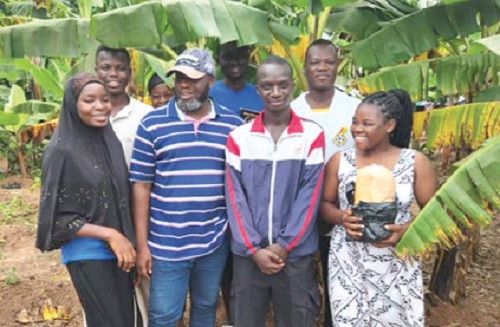In the last third of every academic year, thousands of UDS students fan out into the countryside of Ghana with a purpose.
Their noble mission is to perform the university’s mandatory Third Trimester Field Practical Training Programme (TTFPP).
Level 100 and 200 students of the university from all disciplines, including Accounting, Medicine, Agricultural Science and Development Education Studies etc, participate in this life-changing experience.
For eight weeks, these interdisciplinary groups of students immerse themselves in communal life among their hosts, learning, bonding and documenting their experience.
Think of TTFPP as a transformation of the community into an extension of the lecture theatre for the kind of learning one could never hope to get in the lecture theatre.
Whether it is in Guruma krom in the Nkoranza South District or at Nyetua in the Savelugu Municipality, our students take up residence in these communities, fully immersed in community life, and become ‘actual residents’ for the entire duration of the stay, providing them with invaluable practical experience.
The communities afford a rich landscape to engage the minds of these students, as they examine the social, economic and cultural mosaic of these communities in its rich detail, hoping to make a contribution that leaves a positive legacy.
They interrogate the nuances of community life and dissect the often-taken-for-granted, serious, and not-so-serious everyday happenings and developments in the communities through conversation.
While tucking into countryside cuisines of farm-fresh ingredients and ‘obese’ grasscutters, our students lead in gathering data that is hardly ever gathered by many conventional government systems, constructing rich community profiles in the process.
Many MMDAs and NGOs have utilised the data and insights from these students’ TTFPP reports to design impactful projects and interventions.
The manifold benefits of our unique TTFPP programme to the students, communities and indeed the country are too many to recount here, and I hope one of these days, an intrepid graduate student will embark on the goal of documenting the impact of this programme in an organised and rigorous way.
While this write-up will not attempt that, let me highlight a few notable aspects of this invaluable experience.
Society
In a multi-ethnic and pluralistic society such as ours, where differences abound, mutual distrust and ethnic stereotyping are common occurrences. These tensions pose significant challenges for social harmony and national cohesion.
Naturally, nothing tends to diffuse these tensions better than “knowledge of the other”.
The TTFPP places students in diverse communities, exposing them to various cultures, orientations and belief systems.
During a visit to Bawa Kuraa, a Dagomba student enthusiastically shared with me his newfound ability to rattle romantic likpakpal phrases, the language of the Konkomba people.
Similarly, students from the North gain first-hand experience of southern culture and norms while undertaking the programme in the South, and vice versa.
This cross-cultural experience not only deepens students' understanding of different ways of life but also showcases the renowned Ghanaian hospitality.
By exposing young people to these multi-cultural contexts, we are helping to reduce mistrust and bias, and it begins to feel like a useful signpost on the road to social cohesion and national integration.
Market
In the labour market, it takes more than a degree certificate to stand out to recruiters. In what is seen as a chaotic job search space, it will take something extra, usually soft skills, creativity and the ability to think outside the box, to emerge from the crowd.
The individual forged out of the TTFPP experience is not just your regular university graduate, but a well-rounded, culturally sensitive employee who not only has the words to articulate a problem but is armed with the tools to solve it.
The TTFPP programme is a rich pathway to develop essential skills, as well as entrepreneurial abilities, through hands-on experience.
By way of disclosure, I transitioned to academia after over a decade of working for NGOs, both local and international. I used to interview fresh graduates for development jobs.
It was always refreshing to encounter UDS graduates.
They were always exceptionally prepared, not just for the interview but for the job position.
UDS graduates possessed a level of maturity and confidence that was impressive, setting them apart from their peers. We hired them, logically!
Your all
To my dear students, you are getting something in addition to the degree.
Give the programme your all, and you will be glad you did. More than a few of you who have been lucky enough to participate in this ritual will admit freely that the selection of the communities is not calibrated to place students in the most comfortable or accessible places, but with the benefit of hindsight, you would be the first to admit that the experience was worth any amount of navigating pothole-ridden roads or living without some of the conveniences of urban life.
You would also admit that you walked away with an understanding of “how the rest of the country lives”, which of course makes you a better and informed citizen.
Of course, management and lecturers of the university believe in what they are doing. During monitoring visits, we accompany students on the learning journey.
Some supervisors go as far as to accompany students and communities to the farms and participate in other activities with the communities.
We interact and share life experiences with the students, often resulting in motivation for the students.
As the students would say in the spirit of Liverpool's iconic anthem, You'll Never Walk Alone!
I firmly believe that the TTFPP at UDS is a groundbreaking training approach that deserves more recognition.
I extend an invitation to policymakers and the President to visit and interact with our students in the field, to witness first-hand the transformative impact of this programme.
More than this, the university itself must invest in bringing its unique selling point to the rest of the world.
I believe they call it “branding” or something.
The writer is the Dean of UDS, Tamale.

